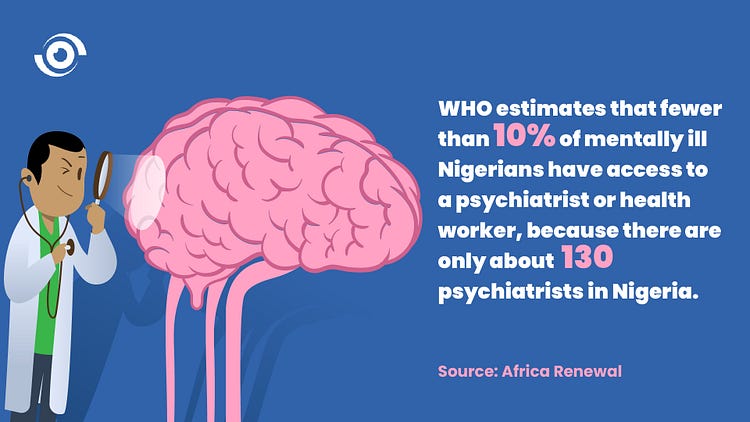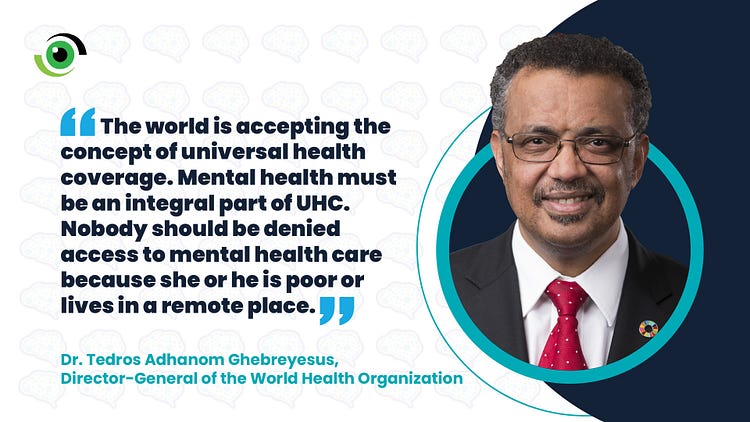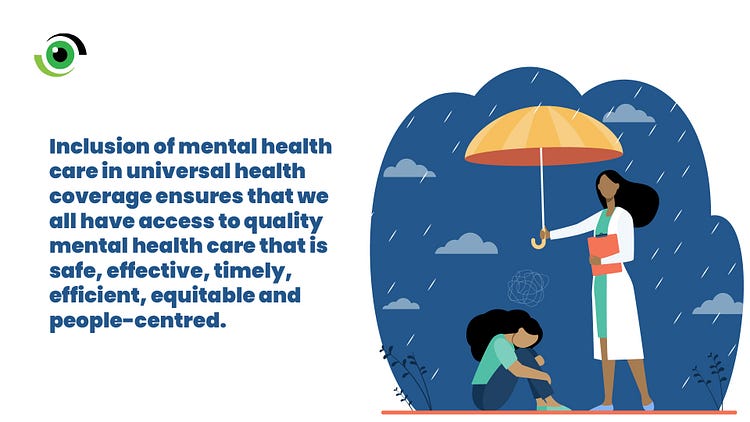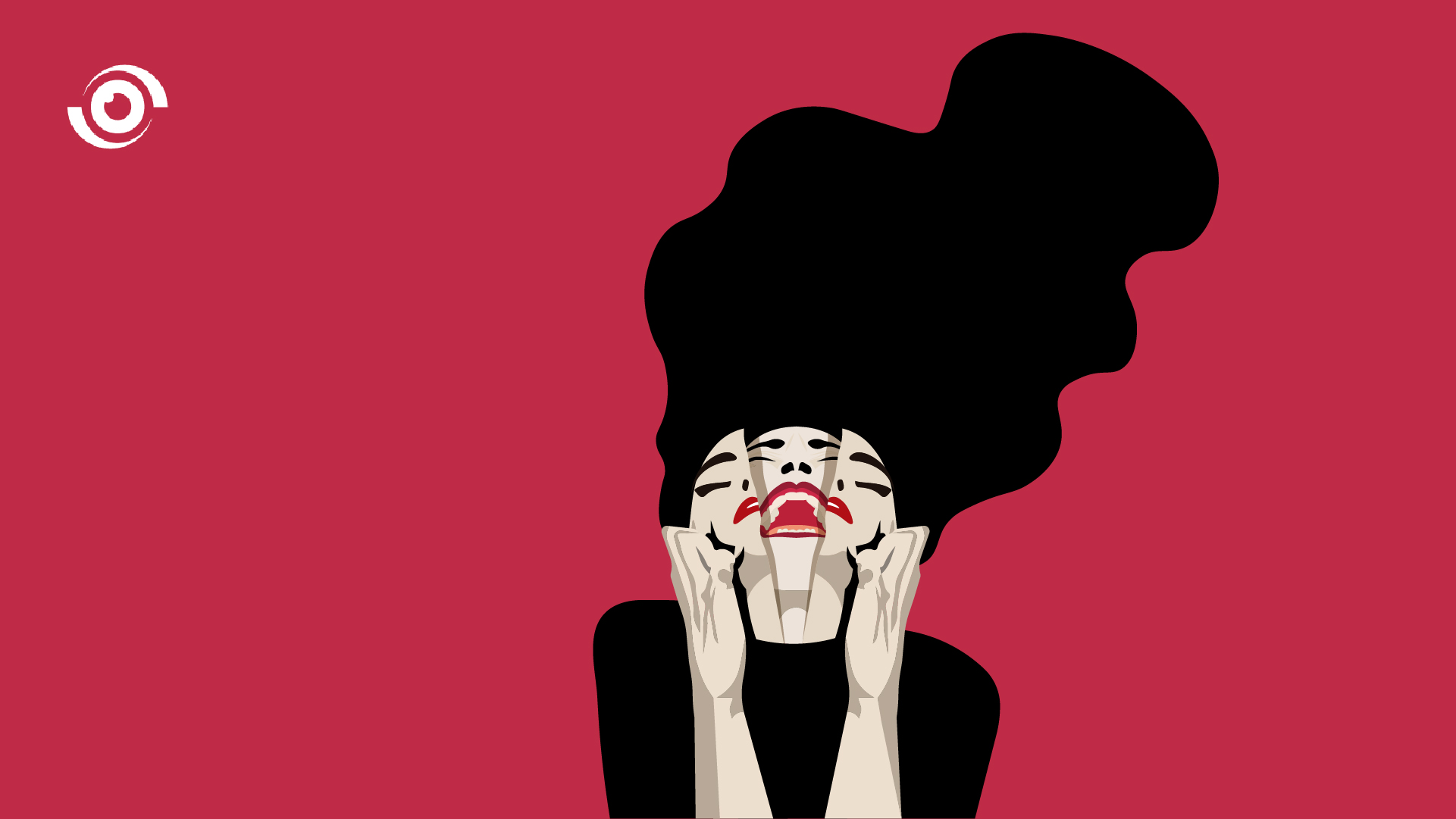“Without mental health, there can be no physical health”- Dr Brock Chisholm
It is not an uncommon sight to see naked or half-clothed persons roaming the streets of villages, towns and cities in Nigeria. Commonly called ‘Ototolo’ (madmen) by the Ugep people of Cross River State, they live on and eat off the streets and generally display bizarre behaviour. No one knows how they got to be this way but public opinion is usually that their condition is incurable and so they are sentenced to life on the streets until the day they die or disappear.
This is the face of mental illness that most Nigerians see, and this forms many people’s perception of what mental illness is.
We often fail to see the ones who appear to be living normal lives but in fact, are struggling with mental illnesses, so devastating yet invisible, that if left untreated, could be fatal.
What is Mental Health?
Mental illnesses are health conditions involving changes in emotion, thinking or behaviour or a combination of all. They are behavioural or mental patterns that cause significant distress or impairment of personal functioning. Such behaviour may be persistent, relapsing or occur as a single episode.
I remember George (not real name), a distant relative and a regular playmate each time we visited the village for the holidays. At 11 years, he started acting strangely and family and friends convinced his mother that it was simply a “spiritual attack” that could be taken care of in a church. The closest psychiatric hospital was 124 km away and even if she wanted to, I don’t think she had the means to make that journey. So, she took George from church to prayer house, in a desperate bid to fix him. I don’t know the entirety of all that she did because I was a child. But I do know that his condition did not improve and eventually, she gave up. Years passed and while the rest of us grew up and moved on, she kept George locked in her 2-bedroom apartment and would only let him out late at night.

Mental health is defined as a state of well-being in which every individual realises his or her potential, can cope with the normal stresses of life, can work productively and fruitfully, and can contribute to his or her community. The priority placed on mental health is underscored in the World Health Organisation’s (WHO) definition of health in its constitution: “Health is a state of complete physical, mental and social well-being and not merely the absence of disease or infirmity.”
Nigeria’s outdated mental health laws
Mental health has historically been neglected in Nigeria’s health and development policy agenda. The Regional Lunacy Law of 1958, the only law remotely connected to mental health in Nigeria, perceives all mental health issues as madness; there is no mention of prevention, promotion and treatment. The name of the law is in itself derogatory to people with mental illness. In addition, its components promote stigma by retaining discriminatory terms, and criminalises attempted suicide, among other things.
Nigeria’s only existing Mental Health Policy document was formulated in 1991. In 2003, a bill for the establishment of a Mental Health Act was introduced. It was withdrawn in 2009 and re-introduced in 2013 but was not passed. In 2019, Senator Ibrahim Oloriegbe, Chairman, Senate Committee on Health, sponsored a ‘Mental Health and Substance Abuse’ Bill. The bill passed through the third reading in December 2020. Currently it is unclear whether the bill is at the harmonisation or assent stage. However, if the bill becomes law, it will make provision for adequate budgetary allocations for mental health facilities and service providers, which will be a step forward for mental health provision in Nigeria.
Insuring mental health services
Universal Health Coverage (UHC) means that all people have access to the health services they need without the risk of financial hardship when paying for them but according to Dr. Ubong Etudoh, a Consultant Psychiatrist in Abuja, most people with mental illness in Nigeria don’t get access to care and one of the reasons is cost. “People that have chronic mental health issues are in and out of the hospital quite often. The social and economic loss is quite high and a lot of them might not be able to afford it” he said.
Edward (not real name), a finance executive who recently had to seek mental health services for his ailing relative readily agrees. Most hospitals don’t advertise mental health services so, at first, he didn’t know where to go. He approached a private facility but when they gave him a bill of 2 million naira for a 3-month stay, he had to look around for cheaper alternatives. He finally found a government-owned hospital in Karu, Abuja, which came highly recommended. Although he can pay the required costs because he has some disposable income and help from family, he noted that, “Somebody who is not very strong financially and who is managing the case alone would need the support of health insurance to make sure that the cost does not discourage the person from accessing the required care”.
Edward has a good health insurance plan and early in his search, he reached out to the health maintenance organisation (HMO) under which his organisation is registered, expecting that their services included mental health. However, he was told that they did not have any hospital that offers mental health services on their list.
This piqued my interest and so I decided to do a little digging. I randomly selected and called up five HMOs in five different cities in Nigeria to enquire about coverage for mental health services. None provided coverage. Likewise, according to Dr. Etudoh, there are several mental health services that are not covered by the National Health Insurance Scheme (NHIS). A look at the NHIS benefit package in the NHIS Membership Handbook, reveals that drug abuse/addiction is listed under conditions that are excluded from the benefits package of the NHIS; while it is not clear exactly how well other mental health conditions are covered.

No UHC without Mental Health
We could play the ostrich and bury our heads in the sand, but the truth is, with the insecurity and conflicts happening in different parts of the country, as well as increasing substance abuse, the number of people living with mental health challenges is growing daily. We may not have the exact numbers in Nigeria but global statistics have revealed that the COVID-19 pandemic and the resulting economic and social effects are taking a particularly hard toll on many people’s mental health and aggravating the conditions of people already suffering from mental illness and substance use disorders.
In 2019, the WHO launched the Special Initiative for Mental Health (2019–2023): Universal Health Coverage for Mental Health. This Initiative will advance mental health policies, advocacy and human rights, and scale up quality interventions and services for individuals with mental health conditions, including substance use and neurological disorders. The core goal is that by 2023, 100 million more people in the world will be able to access affordable, quality mental health services at community level.
Dr. Tedros Adhanom Ghebreyesus, Director-General of the WHO said, “The world is accepting the concept of universal health coverage. Mental health must be an integral part of UHC. Nobody should be denied access to mental health care because she or he is poor or lives in a remote place.” Therefore, every country must make sure that care for mental, neurological and substance use disorders is included in health care benefit packages and insurance schemes.
Dr. Etudoh confirmed that there are only about 200 practicing psychiatrists in Nigeria. For a nation of 200 million people, this means that there is roughly one psychiatrist for every 1 million citizens. We cannot successfully improve access to healthcare without first building human resource capacity to deliver mental health and social care. We need more psychiatrist nurses, psychologists, social workers, and occupational therapists.
Despite the large population, resources for mental health remain scarce and overconcentrated in urban areas and these facilities are overstretched. Investing in primary healthcare centres to ensure that they can provide prompt diagnosis, treatment and referral of people with mental disorders can help reduce the burden on facilities in urban areas.

Nigeria is also way overdue for a new mental health bill. The new bill must contain vital components that clearly address important issues such as fundamental rights of people who are mentally ill, regulations for mental health insurance coverage to improve financial protection, proper funding of mental health facilities, and compliance with WHO recommendations for mental health and substance abuse.
The last time I saw George was nine years ago, he is now about 35 years old and is still confined to his mother’s rooms. It is for him and for every one of us that we must continue to promote the inclusion of mental health care in universal health coverage to ensure that we all have access to quality mental health care that is safe, effective, timely, efficient, equitable and people-centred.
At the time of publication it came to our notice that Dr. Ubong Etudoh passed away suddenly. The interview with him was done two weeks ago. We at Nigeria Health Watch commiserate with his family and friends during this difficult time.



Thanks for this, truly, there’s no U without Me.
I do hope this will get the attention of our policy makers and relevant institutions.
There was a mentally challenged individual (known in the area) who laid one day just at the doorstep of a private health facility, bleeding from an injury he had (as a result of an altercation which partly resulted from his mental state).
After attending to his urgent medical need (without the affected individual paying a dime of course), all efforts to get mental health treatment for him at the government owned psychiatric hospital and teaching hospital didn’t work.
He had no access to free or subsidized mental health care and no health insurance!
Thank you for beaming the light on mental health. There is a more recent and updated mental health policy for Nigeria that has been made public by the Federal Ministry of Health Abuja, Nigeria i.e. “National Policy for Mental Health Services Delivery August 2013”. In addition, a public hearing of the proposed National Mental Health Bill was held in Abuja February 2020.